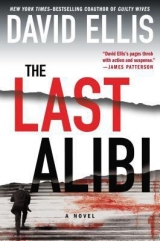
Текст книги "The Last Alibi"
Автор книги: David Ellis
Жанры:
Триллеры
,сообщить о нарушении
Текущая страница: 11 (всего у книги 31 страниц)
PEOPLE VS. JASON KOLARICH
TRIAL, DAY 2
Tuesday, December 10
37.
Shauna
“The People call Detective Raymond Cromartie,” says Roger Ogren.
Some people just look like cops. Ray Cromartie is one of them. The confident swagger, thick nose, wary eyes, and crooked smile. He is a bit overweight, with jowls and a ruddy drinker’s complexion, a nick or two on his neck from shaving. His hair is wavy, the color of ash. He’s the kind of man who could be charming at the right moment, comforting to a child, and intimidating as hell with a bad guy. His cologne lingers with me even as he’s reached the witness stand and begun the introductory portion of his testimony.
Cromartie goes back over twenty years on the force, the last nine as a detective. Lightner, who knows all the cops, says he’s “good people,” which I’ve always thought was a stupid saying.
“I arrived about half past one in the morning, July thirty-first,” Cromartie says. “I spoke with Officer Garvin and then took a look at the crime scene myself.”
“And what were your initial impressions?” Ogren asks.
“I saw no indication of forced entry,” he says, right out of a TV show. They teach prosecutors nowadays to be aware of all of the criminal trials people see on TV, to understand what assumptions they’ll bring with them to the courtroom and what language they’re comfortable with. No sign of forced entry, Lieutenant! “I saw very little indication of a physical struggle, as you can see from the photographs. The second floor was relatively intact in terms of the furniture, things on top of the kitchen counters, that kind of thing.”
“What happened next, Detective?”
“I wanted to speak with the defendant. He was seated on the couch in the living room.”
“And did you speak with him?”
“I did. I made him aware of his Miranda rights. He indicated that he’d been given his warnings from Officer Garvin and that he was a defense attorney by trade and knew well his rights. I asked him if he was willing to speak with me. He said he was.”
“Describe the conversation.”
“I asked the defendant if he knew the victim. He said he did. He said her name was Alexa Himmel.”
Jason stirs, ever so slightly, at hearing Alexa’s name.
“Please continue, Detective.”
“I asked him who Alexa Himmel was to him. He said, ‘We’ve been seeing each other for several months.’”
He’s quoting Jason verbatim there, or at least claiming to. He has his reasons.
“I asked him if Ms. Himmel lived with him. He said that she spent a lot of time at his house and spent the night often, but she had her own house in Overton Ridge.”
“Okay. And what happened next?”
“I asked the defendant what happened tonight. He said he came home from work and found Ms. Himmel dead on the living room floor. He said he called 911 upon finding her. He said the Glock handgun belonged to him, but he didn’t kill her.”
“What did you say next, Detective?”
“I asked him if he knew of anyone who would want to kill her.”
“And what did the defendant say, Detective, when you asked him if he knew who would want to kill Alexa Himmel?”
Drawing out the question, highlighting the significance.
Cromartie pauses a beat for good measure. “He said, ‘I have a pretty good idea, but I can’t be sure.’”
“And what did you say at that point?”
“I asked him who that person was that he had a ‘pretty good idea’ killed her.”
“Did he tell you?”
“No, he did not. He said he wanted to talk to a lawyer and did not want to speak with me further.”
Roger Ogren pauses a beat, as if surprised. “He said he thought he knew who killed Ms. Himmel, but he wouldn’t tell you?”
“Objection,” I say, as if disgusted.
“Sustained.”
Ogren doesn’t protest, having made his point with the question.
“What did you do after the defendant invoked his right to counsel?”
“I ceased any further questioning. An officer stayed with the defendant on the couch while we processed the crime scene. I went upstairs, first of all, to the third floor of the town house. The defendant’s bedroom.”
Ogren admits into evidence photographs of Jason’s bedroom, close-ups on the dresser of drawers and the contents of each drawer, and the bathroom, including shots of the medicine cabinet and the inside of the cabinet beneath the sink.
“What were you looking for in the defendant’s bedroom and bathroom, Detective?”
“The defendant had told me that Ms. Himmel often spent the night. So I was looking for makeup, brushes, perfume, hair sprays or hair gels, tampons or maxi pads. I was looking for things in the shower like women’s shampoo or soaps or loofahs. I was looking in the dresser for any women’s clothing.”
“And did you find any evidence that a woman had been spending time routinely in that bathroom or bedroom? Any evidence that a woman appeared to be staying overnight on a regular basis?”
Roger Ogren is overstating what Jason said to Detective Cromartie. He knows better, but he’s testing me. It’s early in the trial, and he is trying to see how much he can get away with.
“Your Honor,” I say, standing, “could the witness do the testifying instead of Mr. Ogren?”
The judge admonishes Ogren, who nods with his eyes closed. “Detective?”
“As you can see from the photographs, I did not find any of those things. I saw no evidence that a woman spent any time in that bathroom or in that bedroom. Nothing that would indicate that a woman was sleeping over every night.”
Now it’s every night. I consider objecting again.
“I couldn’t square what the defendant had said to me with what I saw upstairs,” he adds.
Jason pats my hand. I take his cue and stay silent, poker-faced. He doesn’t like to object very much when he’s the defense lawyer. Now I’m the defense lawyer, he the defendant, but I find myself following his advice. I shouldn’t. It’s my insecurity and fear getting the better of me. If it’s Jason’s idea and it turns out badly, it won’t be my fault, it will be his.
“Well, what about an overnight bag?” Ogren asks. “Anything that Ms. Himmel would have brought with her, just for that night? A bag with a change of clothes or toiletries, that kind of thing? Did you find anything like that, Detective?”
“No, I did not. I looked very pointedly for that kind of thing and didn’t find it.”
Ogren walks Cromartie briefly through the remainder of his canvass of the house, which takes us to past two-thirty in the morning.
“I advised the defendant that I wanted to take him to headquarters for further questioning,” he says. “I asked him if he would go with me voluntarily. He said that he would, but that he wanted to call his attorney, Ms. Tasker.” He nods to me. “I told him that he could make that call before he left and she could meet us there.”
Shauna, I’m being arrested for murder, Jason had said to me over the phone, at 3:06 in the morning. Not, They want to question me, Alexa’s been murdered, but I’m being arrested. He already knew it was coming. What did he reveal to Detective Cromartie in his mannerisms, his speech, his eye contact or lack thereof, his coolness or his sweat, the vibe he gave off? These are the kinds of things that rarely get revealed in a courtroom.
One of many things about that night, I realize, that I’ll never know.
38.
Shauna
Roger Ogren hits “Play” on the remote. The television screen, facing the jury but angled so the defense may view it as well, comes to life in black-and-white. The fuzzy screen shows a nondescript room. Detective Ray Cromartie is in shirtsleeves, tie pulled down. Jason sits across a metal desk from him, his hair hanging into his eyes, in a button-down dress shirt open at the collar. To Jason’s right is Bradley John, our associate, his hair slicked back, still wet from the thirty-second shower he must have taken when he got the call from me in the middle of the night.
Cromartie, on the witness stand, has already introduced the fact that Jason gave a recorded statement. The defense has stipulated to the admissibility of the videotaped statement, at least the portions that Roger Ogren plans to introduce. The whole thing wasn’t very long, only about thirteen minutes—short enough that, if I were the prosecutor, I’d probably play the whole thing. But Ogren has decided to just pull out a couple of vignettes. One of the phrases Jason has always used to describe Ogren is control freak, and that fits. He just wants it exactly the way he wants it.
The screen shows Jason nearly front-on, only slightly angled so that a bit of Cromartie’s profile is also apparent. I’m sure the detective isn’t wild about the jury spending time with a close-up of the bald spot on the crown of his head or the fact that his tie is showing beneath his collar in the back, but presumably they’re spending more time on Jason, staring into the table, his eyes narrowed as if in concentration. To look at him, you wouldn’t know that a woman was just found dead in his town house.
“I don’t know what time Alexa got to my house,” Jason says on the tape. “She said she was going to be there by six-thirty or seven, but I don’t know. And I don’t remember exactly when I got home. I wasn’t checking that sort of thing. Just like I don’t know what time I called 911. All I know is that I walked upstairs and I found her there. She was . . .” Jason waves a hand, like he’s making a throwaway point. “She was obviously dead. I . . . just stared at her at first. I couldn’t believe it. She was . . . gone. Then I dialed 911.”
“You drove home tonight? That’s how you got home?” Cromartie asks. His voice has more of an echo to it, the acoustics favoring Jason, the primary focus.
Jason nods. “Yeah, I drove.”
“That’s your SUV parked in the garage?”
Jason nods, his eyes rising to the ceiling over Cromartie’s head. He scratches his hand.
“You came into the house through the garage?” Cromartie asks. “The door to the garage?”
Jason nods absently. Still scratching his hand—the knuckles, the palm, searching for the itch. “Right. I walked into the house and went upstairs,” he says.
“Was the front door locked, Jason? The front door, not the door that opens to the garage.”
The clock in the corner of the TV screen keeps time by the second: 4:12:06 . . . 4:12:07 . . . 4:12:08 . . .
“Jason—”
“I assume the front door was locked, yeah. I always lock the front door,” Jason says.
“And what about the back door, Jason? Was that locked?”
“Of course,” Jason says. “I live in the city.”
Cromartie nods, that bald spot on the top of his head moving out of sight and then back in. “And what about the door to the garage? Is that usually locked, Jason?”
Jason shrugs. “Sometimes? Sometimes not, I guess.”
“From outside, can you get into the garage without an opener?” asks Cromartie.
Jason shakes his head. “No.”
“No?” Cromartie presses.
“No. You need a . . . garage-door opener.”
“Did Alexa have a garage-door opener?”
“No,” Jason says. “Just me.”
“And you said Alexa was already there, dead, when you got home,” says Cromartie.
Jason looks at him like he is mentally impaired. “Yeah. Of course.”
“How did she get into the house, Jason? If she got there before you.”
Still scratching his hand. Now his forearm, too. Jason looks down in thought.
4:12:45 . . . 4:12:46 . . . 4:12:47 . . .
“Jason—”
“Front door, I guess.” Jason shrugs. “She’d just use her key, I guess.”
“Her key? Did Alexa Himmel have a key to your town house?”
4:12:55 . . . 4:12:56 . . . 4:12:57 . . .
At 4:13:04, Bradley John says, “If he remembers. It’s late, and it’s been a difficult night, to say the least. Most people would be asleep right now.”
“Understood, Counselor,” Cromartie replies with ice. “If he remembers.”
4:13:19 . . . 4:13:20 . . .
The jury is fixated on the tape, each of the jurors craned forward.
At 4:13:25, Jason looks up at Detective Cromartie and says, “Yeah, Alexa had a key.”
Stop tape.
Roger Ogren stands in front of the blank screen. “Detective Cromartie, did you find a set of keys on the person of Alexa Himmel that night?”
“I did.”
“And what, if anything, did you do with those keys, Detective?”
“I personally tested each of the keys on each of the doors to the defendant’s town house. The front door, the side door opening into the garage, and the back door.”
“And what did you find, Detective?”
“None of the keys on her key chain opened any of his doors. She had three keys. One was to her Prius. One we later determined was the key to her house, and the third was a key to her office at work. There was no key to the defendant’s house on that chain.”
“Well, Detective.” Roger Ogren angles slightly toward the jury, his hands open in wonder. “Maybe Ms. Himmel had such a key, but free of that key chain.”
“I considered that possibility, of course. We searched every inch of that town house and we searched the victim, Ms. Himmel. We combed the area outside the house. We turned every inch of the defendant’s property inside out. There was no freestanding key to the defendant’s house. The only keys to his house were on the defendant’s key chain.”
“Well, as far as you could tell, was there any way that Ms. Himmel could have gotten into the defendant’s locked house before he got home?”
“None.” The detective shakes his head. “She had no key and no garage-door opener. I couldn’t find any way that Ms. Himmel could have walked through a garage door or a locked front or back door. The windows didn’t provide any access, either—they were not reachable from the ground. The defendant’s statement didn’t wash.”
“Objection,” I say. “Move to strike.”
“The last comment is stricken,” says the judge, trying to unring the bell.
Ogren then moves back to the tape again, just at the point that he stopped.
“Alexa didn’t have a key, Jason,” says Detective Cromartie, leaning forward now, on the attack. “I checked. I checked every key on her key chain. She had no way of getting into your house without you letting her in.”
Jason, running his nails up and down his arm, squirming a bit in his chair, shakes his head.
4:13:44 . . . 4:13:45 . . . 4:13:46 . . .
“She didn’t have a key, son,” says Cromartie. “If she did, tell me where it is. Or tell me how else she could have possibly gotten inside your house. I’m trying to help you, Jason, but you gotta help me. Tell me how in God’s name she could have gotten into your house without you. Tell me how in the world she could have been in your home, dead or even alive, before you got home.”
Jason sucks his lips into his mouth. His hands fidget. He shakes his head absently. He drums his hands on the metal table. “We’re done,” he says to his lawyer, Bradley John.
“We’re done,” Bradley says to the detective.
“I have a lot more questions, Jason. A lot more. Like, where were you tonight that you didn’t get home until after midnight? Can anyone vouch for you? How did Alexa—”
“I said we’re done,” Bradley says again. “That means we’re done.”
Stop tape.
As Roger Ogren kills the DVD player, several of the jurors get aha looks on their faces, solemn nods, grim realizations. I imagine cartoon bubbles over their heads, displaying their thoughts, the words “That’s right, you are done” in bold letters.
39.
Jason
My lawyers, Shauna sitting next to me and Bradley John next to her, scribble notes as they listen to the examination of Detective Cromartie. He’s done well on the witness stand. He’s a strong, assertive type, but he isn’t overplaying his hand, not coming on too strong. A good cop knows where to draw that line. Ray Cromartie, I’ve thought since that night, is a good cop. He was stringing me along pretty well before I abruptly terminated the interview. He scored one on the key for Alexa, with me shutting the interview down while I was on the ropes, and I’m sure he knew that, but he was clearly disappointed when I pulled the plug. He wanted what all of them want: a confession. He caught me in a couple of—ahem—inconsistencies, which is a nice consolation prize, but he didn’t get what he came for.
Shauna is spending too much time on her notes. She’s coping, I think. She’s forcing herself to stay clinical, to focus on questions and answers and not on the reality of what is happening here, and what happened that night. This is tougher on her than I expected, hearing all this and bearing the burden of keeping me out of prison. She’s one of the best lawyers I know, but she has almost no experience in a criminal courtroom. She mentioned more than once that we should consider some highbrow defense attorney, Gerry Salters or someone like that, but it had to be her. It had to be.
After some preliminary questions with the detective, Roger Ogren brings the television screen to life again, taking us back to the interrogation at a different point. Roger Ogren has decided to cherry-pick through this tape, playing various tidbits out of order, because some of the stuff on this tape will be shown to the jury through Cromartie and others through the Community Action Team squad officer. This part of the tape began around the sixth minute of conversation:
“You told me back at your house that you have a pretty good idea who killed Alexa,” Cromartie says. “Can you help me out with that? Who killed her, Jason?”
I don’t answer at first. Several seconds pass. I shake my head and wave a hand. “His name is Jim.”
“Last name?” Cromartie asks.
“Just Jim,” I say.
“Well . . . what can you tell me about Jim?”
The way Cromartie says Jim, it’s like he’s dealing with a little kid who is obviously lying.
“He . . . he has red hair,” I say. “He’s big, muscular. He wears glasses. He has a paunch, like, a gut.”
“Why do you think Jim would kill Alexa?”
“To get to me,” I say. “To get to me.”
“Why would Jim want to get to you, Jason?”
“I’m . . . I’m not sure. I just know that he’s angry with me. I’m still trying to figure out why.”
“Did this . . . Jim tell you that he was going to hurt Alexa? Or you?”
I shake my head. “Not in so many words. I wish he had. If he had, maybe I could have done something.”
“I don’t understand what that means,” Cromartie says.
It wasn’t a question, so I didn’t answer it. A nice motto of mine, stolen from my mentor, and a nice tool for dominating a conversation. But probably not so nice when your audience is a jury trying to decide if you’re a cold-blooded murderer.
After a lengthy delay, Cromartie opens his hand, visible to the camera. “That’s it? A guy whose last name you don’t know, who might want to hurt you, but you don’t know why?”
“I wish I knew more,” I say. “I’d love to tell you more, but I haven’t figured it out yet.”
Roger Ogren stops the tape. “Detective Cromartie,” he says, “since this interview with the defendant on the early morning of July thirty-first, has the defendant come back to tell you who ‘Jim’ is?”
“No, sir, he hasn’t.”
“Since this interview, which took place over four months ago, has the defendant come back to tell you why this ‘Jim’ person wanted to hurt him?”
“No, sir.”
“During these four-plus months, has the defendant told you anything at all about this supposed murderer named . . . ‘Jim’?”
“He hasn’t. Not a peep.”
Roger Ogren looks over his notes at the lectern one last time. Shauna takes a deep breath.
I lean into Shauna’s personal space. “You ready for him?”
“Is he ready for me?” she whispers back. False bravado, or I haven’t known this woman half my life.
“Thank you, Detective,” says Ogren. “No more questions for this witness.”
40.
Shauna
Judge Bialek calls a recess before I cross-examine Ray Cromartie. I have my notes in front of me, drawing some arrows to move around some questions, but it’s dangerous to get too wedded to notes. Once you write them down in detail, you tend to stay with them and stop listening to the witness. It becomes less of a fight and more of a conversation. You just have to let go and trust your preparation. You have to take off the training wheels and pedal that big bike down a dark, scary trail.
Jason is taking a bathroom break with an armed escort, so it’s just Bradley John and me in the conference room adjacent to the courtroom. I don’t like to stray too far during breaks. Elevators can break down, restaurants can take too long to bring the food. I can handle the stress of a trial, I’m used to it, but I could live my whole life and never get used to the stress of being late. So Jason’s brother, Pete, who is in town for the trial, has brought us sandwiches from a deli.
I pick at a turkey and Swiss on wheat while I meditate. After a moment I push my notes away and breathe out. “I can’t look at this anymore. I just need to do it.”
Bradley is chewing on a pickle and staring at a transcript from the interrogation. “I don’t know why Jason ever agreed to that interview,” he says. “He knows better than anybody not to do that.”
“Sometimes you can’t take your own advice,” I offer.
“Yeah, but—I mean, it’s one thing if you try to talk your way out of things. The perps I used to interrogate would do that all the time. They’d be full of stories. ‘Here’s what happened, see, it went like this, see,’ and I’d let them just drone on and on and tangle themselves in knots. But Jason didn’t argue a case for himself. He basically just let Cromartie beat him up.”
I scrap the sandwich and go for the good stuff, the salt-and-vinegar potato chips. “You’re forgetting that Jason was still under the spell of OxyContin,” I say. “You saw him scratching his arms in there and smacking his lips. Classic withdrawal symptoms.”
“I know, I know. But all he had to do was take Five. Just assert his right to remain silent and shut the whole thing down. That’s what I told him to do. I told him, before we went in—”
“I know you did, Bradley. I know you did.” I pat his arm. This interrogation has bothered Bradley as much as anything in this case, because it was the one thing that happened on his watch. He gave Jason sound counsel—to not make a statement—but he was overruled. Surprise! Jason didn’t listen to advice. Truly, he wouldn’t listen on his best day, and on top of everything else, there was the painkiller problem. It’s hard to know Jason’s frame of mind in that police station. I wish I knew. I wish I knew whether Jason knew what he was doing or screwed this whole thing up by talking to Cromartie.
“He looks guilty,” Bradley says. “On that tape, he looks guilty.”
“I know he does.” Jason knows it, too.
I crinkle up the empty bag of chips and toss it toward the trash can. The bag unfolds midair and glides to the carpet, wide right. Golf was always my game.
“And the house key?” Bradley says. “I mean, if Jason didn’t say a word to the cops, they’d still be trying to piece together the sequence of events. But Jason told them he came home and found her there dead, and now we’re stuck explaining how she got into a locked house without a damn house key and no sign of forced entry. I mean, am I missing something? Do we have an answer for that stupid house key?”
“I don’t know of any answer,” I concede, feeling sweat dripping down my armpits.
“No. So that’s all I mean. Jason did himself no favors.” He shakes his head. “It was my job to stop him and I didn’t, Shauna.”
“Let’s not relitigate the past,” I say. Bradley has beaten himself up over this countless times. I thought I was done listening to it. It’s the trial, I guess, the public unveiling of the interrogation for the jury, that has brought down a fresh rainfall of remorse on our associate.
“We have our case and we’re going to make it,” I say. “It may not be the greatest, but it’s all we have, and we have to believe it with every fiber of our beings.”
“Right. That’s right.” Bradley gives a presumptive nod and snaps back into trial mode. “You’re right. Jason didn’t kill Alexa, right?” He gives me a playful push. For some reason, he likes to push me.
I busy myself with my notes, fitting them together sequentially and lining up the edges like a schoolgirl would.
“They can’t prove that he did,” I say, more to the point.








